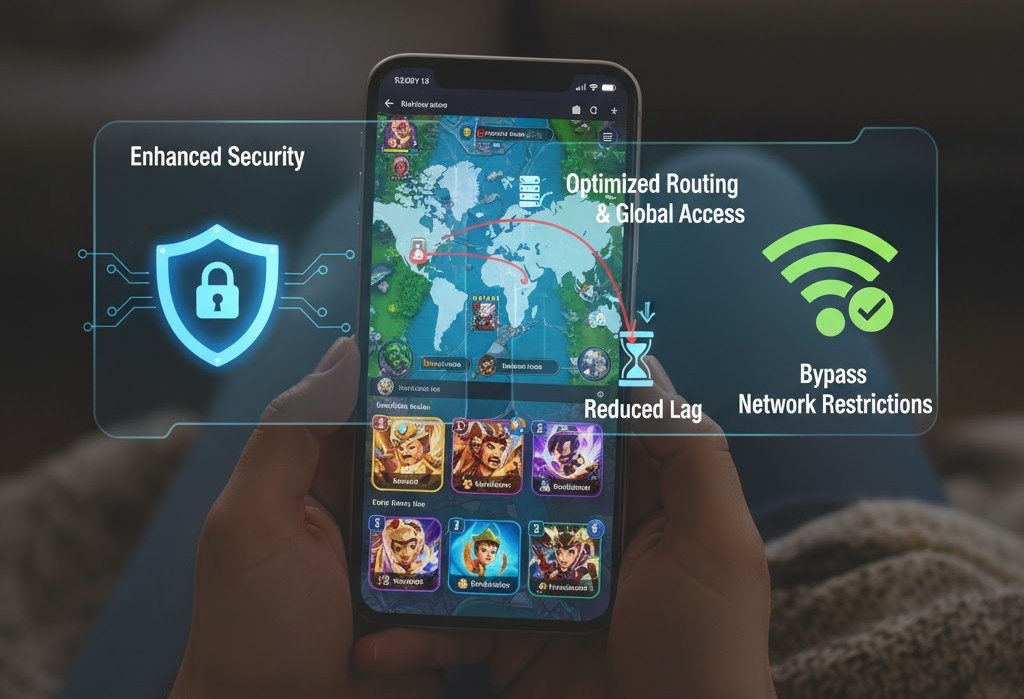Blog
Why VPNs Matter Even for Browser-Based Mobile Games

Even though browser-based mobile games don’t require downloading or installation, they still depend on constant real-time data exchange between your device and remote servers. Network latency, inefficient routing, and ISP throttling can all disrupt gameplay. A Virtual Private Network (VPN) helps optimize and stabilize these network paths, reducing lag and improving performance.
VPNs also enhance privacy and security by encrypting data, preventing IP leaks, and maintaining a consistent connection when switching between Wi-Fi and mobile networks. For mobile gamers, especially those using public or unstable networks, a reliable VPN can make gameplay smoother, faster, and safer.
Routing Overhead and Choking Points
Even though browser-based games don’t require a full installation, they still rely heavily on a stable and efficient data route. Every asset, frame, input, or sync signal travels upstream and downstream in real time. If your Internet Service Provider (ISP) uses a circuitous route to the game server or has poor peering with certain networks, you’ll experience higher latency, delayed responses, or frequent lag spikes.
A VPN (Virtual Private Network) with well-connected and well-peered exit nodes can optimize this route by bypassing inefficient paths, resulting in smoother and more stable gameplay.
Bypassing Traffic Shaping or Throttling
Some ISPs identify and throttle specific types of traffic, such as gaming, streaming, or large downloads. This can cause lag even if your base connection speed is strong. A VPN helps mask your gaming traffic, encrypting and disguising it so the network routers cannot easily categorize or deprioritize it. Even a Free VPN can sometimes help with this, though premium VPNs offer more consistent performance and reliability.
Stability Across Parallel Flows
On mobile devices, multiple background processes often run simultaneously—streaming music, downloading updates, or syncing data. Without isolation, all these compete for bandwidth.
A quality VPN allows you to segment or prioritize your gaming traffic, ensuring the game remains smooth and stable even while other tasks are ongoing in the background.
Mobility and Smart Reconnection
Phones and tablets frequently switch between Wi-Fi and mobile data networks, especially when moving between locations or using hotspots. This can easily interrupt a gaming session.
A VPN with smart reconnection technology keeps the encrypted tunnel open through these network changes, maintaining your connection and preventing your real IP address from being exposed mid-session.
Privacy When Communicating With Servers
Even browser-based games connect to various servers—analytics, chat, leaderboards, or mod hosts. These servers may collect information about your device or IP address.
Using a VPN conceals your IP and location, protecting you from unwanted tracking, targeted attacks, or even identity risks. It adds a critical layer of privacy, especially when gaming on public Wi-Fi networks.
What to Look for in a VPN for Browser-Based Gaming

- Strong backbone connections with multiple exit nodes: The closer the exit node to core internet exchanges, the fewer transit steps and the better the performance.
- Adaptive routing and node switching: The VPN should automatically detect path degradation and reroute traffic to a better node mid-session.
- Leak protection and kill switch: These prevent your IP or DNS requests from leaking if the VPN tunnel disconnects.
- Split tunneling / app-aware routing: Route only your browser or gaming data through the VPN while leaving other background apps on the direct network.
- Reliable iOS and Android clients: Ensure the VPN app can reconnect quickly, keep tunnels active, and switch networks without breaking the connection.
- Multi-device support: You should be able to use the VPN across your phone, tablet, and PC simultaneously.
- Clear performance metrics: Look for VPNs that provide latency, packet loss, and reliability statistics so you can choose the best node before gaming.
Helpful Hints for Maximizing Your Setup
- Check nodes before playing: Use ping or traceroute tools to measure latency to different exit nodes before starting your session.
- Use split tunneling wisely: Only tunnel your game or browser traffic. Keep large downloads and updates outside the tunnel to save bandwidth.
- Switch nodes during hiccups: If lag or stuttering appears mid-game, try switching to another exit node instead of restarting.
- Activate the VPN before changing networks: This ensures the encrypted tunnel stays open as you move between Wi-Fi and mobile data.
- Rotate nodes periodically: Staying connected to one node for long periods can lead to slower speeds or trigger throttling. Regularly changing nodes can help.
- Run leak tests often: Use online DNS, WebRTC, and IPv6 leak tests to ensure your actual IP address isn’t exposed.
- Disable aggressive battery optimization: Mobile operating systems often pause or stop background VPN services to save power. Whitelist your VPN app to prevent disruptions during gameplay.
Extra Tips for a Smoother Experience
- Test your VPN speed before playing: Some VPNs provide built-in speed tests. Always check latency and throughput before starting a gaming session.
- Choose the right protocol: If your VPN offers multiple protocols (like WireGuard, OpenVPN, or IKEv2), experiment to see which gives you the lowest ping and most stable connection.
- Use wired connections when possible: If you’re gaming on a tablet with a USB-C Ethernet adapter or using a Wi-Fi 6 router, wired or high-bandwidth connections will reduce latency.
- Avoid free VPNs for long-term play: While free options can mask traffic, they often come with limited bandwidth, weaker security, and overloaded servers. For consistent gameplay, a reputable paid VPN is worth the investment.
- Keep your browser lean: Disable unnecessary extensions and background tabs. This reduces resource usage and can minimize browser-based lag.
Conclusion
Browser-based mobile games offer convenience and accessibility, but they’re still sensitive to latency, packet loss, and network interruptions. A well-optimized VPN can significantly improve your gaming experience by maintaining a stable connection, bypassing throttling, and safeguarding your privacy.
Choosing a VPN built for speed, reliability, and mobile adaptability ensures your games remain smooth and secure—whether you’re playing at home, at a café, or on the go.
Disclaimer
Using a VPN can improve performance and privacy, but results vary depending on your device, network conditions, and chosen VPN provider. Always follow the game’s terms of service and local regulations when using VPNs. This article is for informational purposes only and does not endorse any specific VPN brand or guarantee improved performance in every case.
References
- Cloudflare Learning Center – What is Network Latency? – Reference from Cloudflare.com
- Norton – How a VPN Works and Why You Need One – Reference from Norton.com
- Mozilla Foundation – How VPNs Protect Your Privacy Online – Reference from Mozilla.org
- TechRadar – Best VPNs for Gaming and Low Latency – Reference from TechRadar.com
